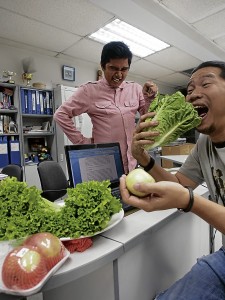Eat veggies when dealing with ‘horrible’ bosses
Before saying goodbye to the month of hearts, here’s a friendly reminder to all stressed-out employees: Save your heart from a “horrible boss” and other serious life stresses, by loading up on your veggies.
Heart disease experts cautioned that office-borne stress such as deadlines, meetings, presentations, job insecurity, financial problems and emotionally charged conflicts with superiors can significantly increase the risk of heart attacks. And if the stressors persist even outside the workplace—marital unrest with the spouse, deaths in the family and being laid off from work—the chances for a fatal heart attack go that much higher.
The American Heart Association meeting several years ago cited a study interviewing 129 heart attack survivors about what happened to them 26 hours before the attack. Serious stress was experienced by 51 percent. In comparison, a large number of people who did not have a heart attack were asked about their stresses. Only 12 percent of those experienced any serious stress in the same time frame.
Healthy ‘stress eating’
Compounding the risks of these external sources of unease are the foods that stressed-out people tend to take, and in binges: foods high in cholesterol and saturated fat. Preventive medicine expert Neil Nedley, MD, author of “Proof Positive,” and the Physicians Committee for Responsible Medicine noted that elevated blood cholesterol levels have been closely associated with fatal heart disease, and that all dietary cholesterol comes from animal products (pork, poultry, beef, fish, eggs, cheese, milk, yogurt). Animal products also contain saturated fat, causing the liver to produce more cholesterol. Saturated fats are easy to spot because they are solid at room temperature, whereas unsaturated fats remain liquid.
A diet based on plant foods, however, can help the heart cope with external stresses. According to a study published in the Australian and New Zealand Journal of Medicine titled “Vegetarian diet, lipids and cardiovascular risk” (J. R. Masarei, I. L. Rouse, W. J. Lynch, K. Robertson, R. Vandongen, L. J. Beilin), basing one’s diet on plant foods—grains, beans, vegetables and fruits—would be the best way to keep saturated-fat intake low and to avoid cholesterol completely. Such a diet—alternately called vegetarian or vegan—is free of all animal products and yields the lowest risk of heart disease. One study showed that people who adopt a vegetarian diet reduce their saturated-fat intake by 26 percent and achieve a significant drop in cholesterol levels in just six weeks.
Several years ago, a study in the American Journal of Clinical Nutrition titled “Hypocholesterolemic effect of substituting soybean protein for animal protein in the diet of healthy young women” (K. K. Carroll, P. M. Giovannetti, M. W Huff, O. Moase, D. C. Roberts, B. M. Wolfe) indicated that besides the low levels of fat eaten in a typical vegetarian diet, vegetable protein also helps decrease risk for heart disease. Studies have shown that replacing animal protein with soy protein reduces blood cholesterol levels even when the total amount of fat and saturated fat in the diet remain the same.















